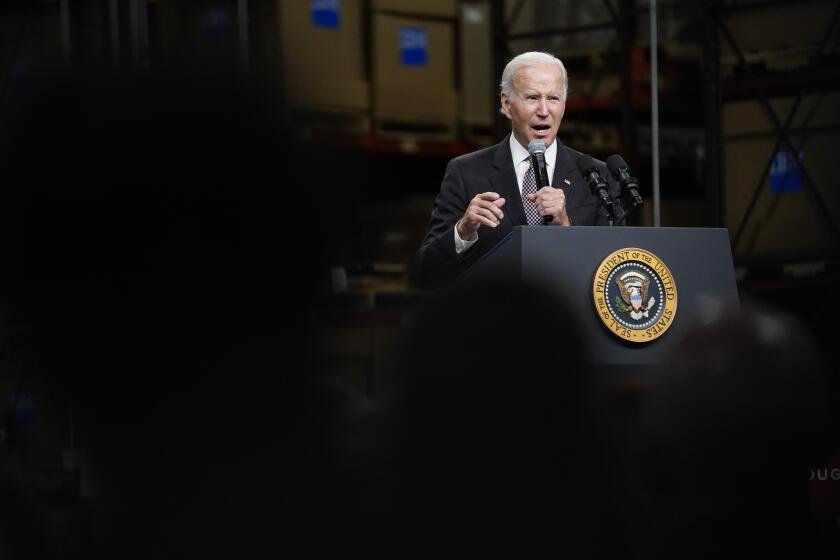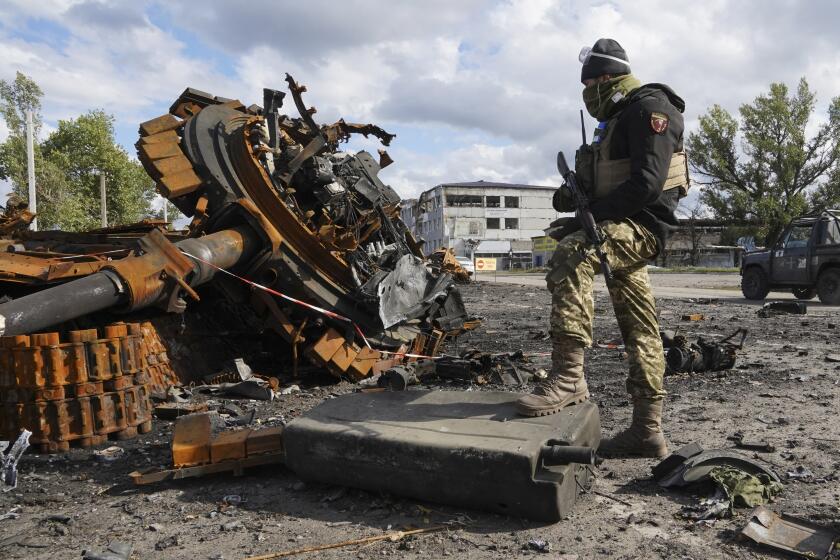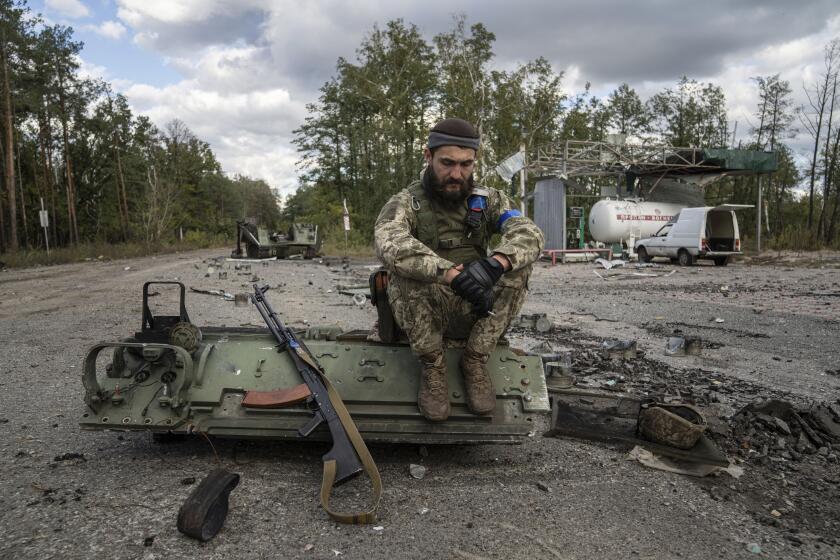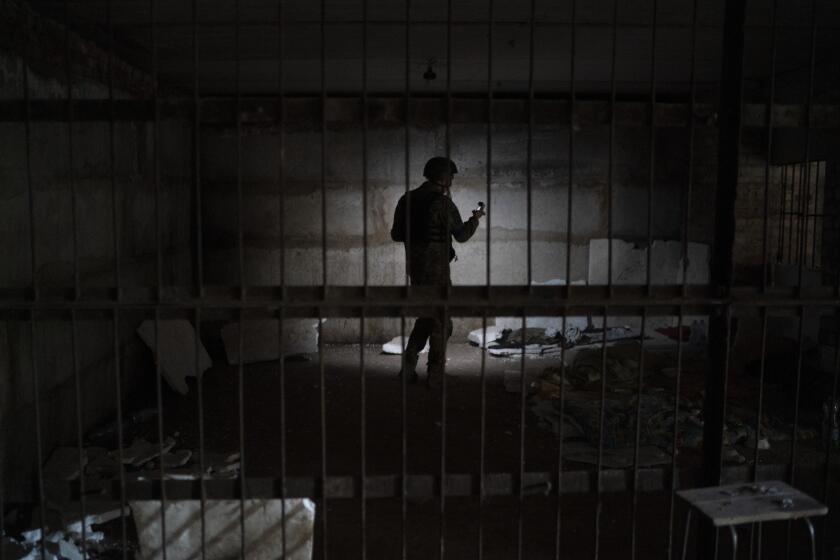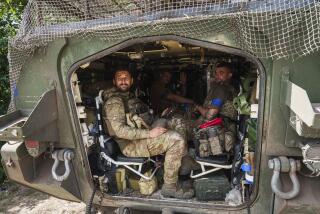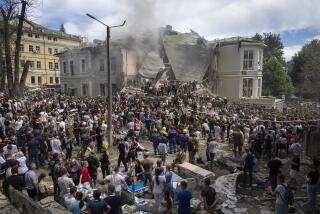Explosions rock northeastern Ukrainian city of Kharkiv
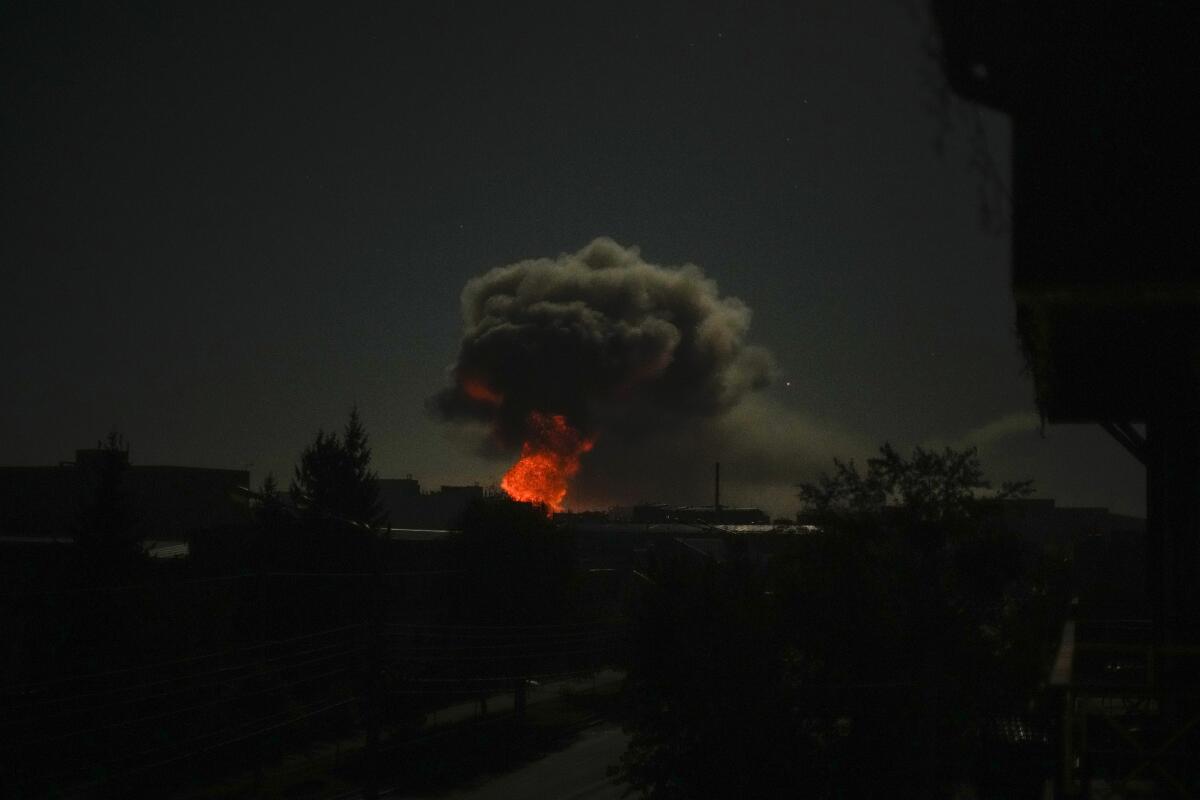
- Share via
KYIV, Ukraine — A series of explosions rocked the northeastern Ukrainian city of Kharkiv early Saturday, sending towering plumes of illuminated smoke into the sky and triggering a wave of secondary blasts.
There were no immediate reports of casualties.
The blasts came hours after Russia concentrated attacks on areas it illegally annexed in its increasingly troubled invasion of Ukraine, while the death toll from earlier missile strikes on apartment buildings in the southern city of Zaporizhzhia rose to 14.
Kharkiv Mayor Ihor Terekhov said on Telegram that the early morning explosions were the result of missile strikes in the center of the city. He said that the blasts sparked fires at one of the city’s medical institutions and a nonresidential building.
In a rebuke to Russian President Vladimir Putin and his conduct in Europe’s worst armed conflict since World War II, the Norwegian Nobel Committee awarded the Nobel Peace Prize to human rights organizations in his country and Ukraine and to an activist jailed in Russia’s ally Belarus.
Berit Reiss-Andersen, the committee’s chair, said the honor went to “three outstanding champions of human rights, democracy and peaceful coexistence.”
Putin has recently illegally claimed four regions of Ukraine as Russian territory, including the Zaporizhzhia region, which is home to Europe’s largest nuclear power plant, whose reactors were shut down last month.
Fighting near the Russian-occupied plant has alarmed the United Nations’ atomic energy watchdog, which on Friday doubled to four the number of its inspectors monitoring plant safeguards. An accident there could release 10 times the amount of potentially lethal radiation than the world’s worst nuclear accident did in Chernobyl 36 years ago, Ukrainian Environmental Protection Minister Ruslan Strilets said Friday.
The president says the risk of a catastrophic nuclear showdown is at its highest level since the 1962 Cuban missile crisis. Did he say too much?
“The situation with the occupation, shelling and mining of the Chernobyl and Zaporizhzhia nuclear power plants by Russian troops is causing consequences that will have a global character,” Strilets told the Associated Press.
The U.N. watchdog, the International Atomic Energy Agency, reported more trouble at the Zaporizhzhia plant, saying Friday that external power had again been cut off to one of its shutdown reactors, necessitating the use of emergency backup diesel generators to run safety systems.
The city of Zaporizhzhia is about 30 miles from the nuclear plant and remains under Ukrainian control. To cement Moscow’s claim to the region, Russian forces bombarded the city with S-300 missiles Thursday, with more attacks reported Friday.
Ukrainian authorities said the death toll from the strikes on apartment buildings rose to 14 on Friday, while 12 other people remained hospitalized.
Missiles also struck the city overnight, wounding one person, Zaporizhzhia Gov. Oleksandr Starukh said. Russia also used Iranian-made Shahed-136 drones there for the first time and damaged two infrastructure facilities, he said.
With its army losing ground to a Ukrainian counteroffensive in the country’s south and east, Russia has deployed unmanned, disposable Iranian-made drones that are cheaper and less sophisticated than missiles but still can damage targets on the ground.
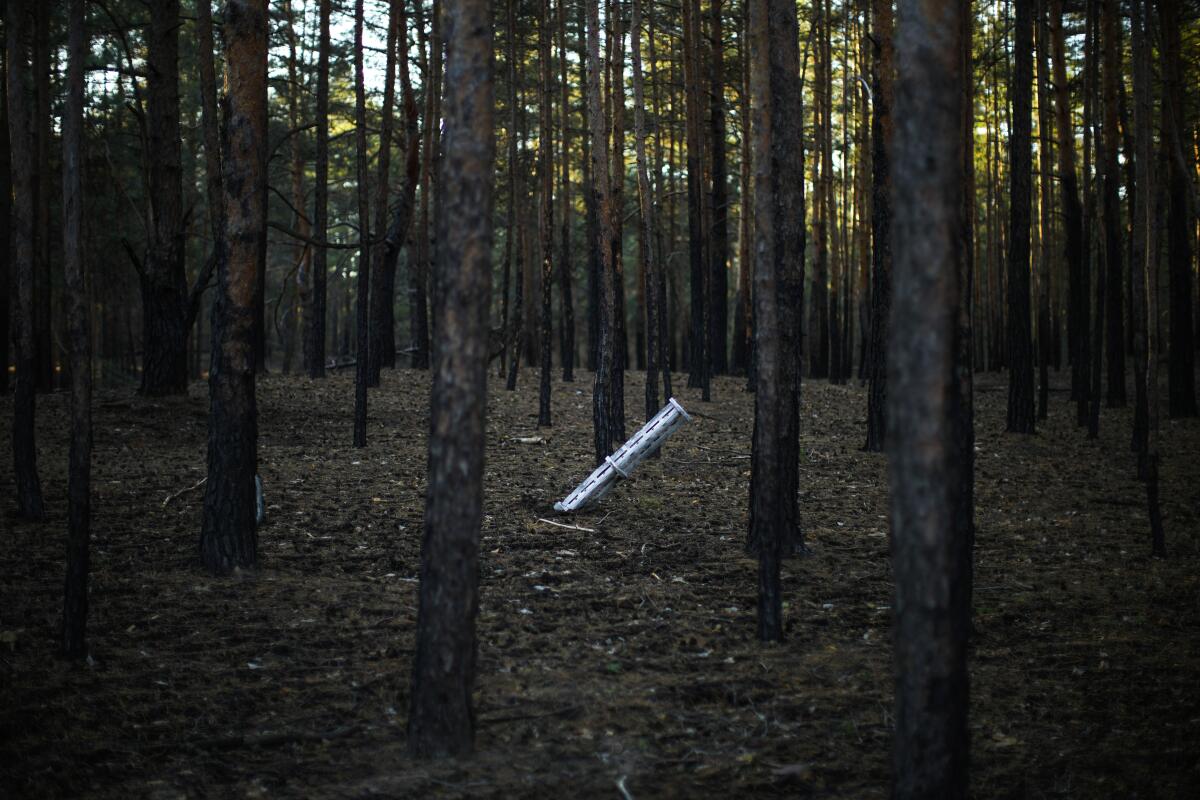
The Washington-based Institute for the Study of War said Russia’s use of the explosives-packed drones was unlikely to affect the course of the war.
“They have used many drones against civilian targets in rear areas, likely hoping to generate nonlinear effects through terror. Such efforts are not succeeding,” analysts at the think tank wrote.
As Russia’s military performance weakens, a notorious mercenary group, long part of the Ukraine fight, steps into spotlight.
In other Moscow-annexed areas, Russia’s Defense Ministry reported Friday that its forces had repelled Ukrainian advances near the city of Lyman and retaken three villages elsewhere in the eastern Donetsk region. The ministry also claimed that Russian forces had prevented Ukrainian troops from advancing on several villages in the southern Kherson region.
Ukrainian President Volodymr Zelensky said in his nightly video address Friday that this week alone, his military had recaptured 300 square miles of territory in the east and 29 settlements, including six in the Luhansk region, which Putin has annexed. In total, Ukrainian forces have liberated 940 square miles of land and 96 settlements since the beginning of its counteroffensive, he said.
In Ukraine’s Dnipropetrovsk region, Russian troops shelled the city of Nikopol overnight, killing one person, wounding another and damaging buildings, natural gas pipelines and electricity systems, the governor reported. Nikopol lies along the Dnieper River across from Russian-held territory near the nuclear power plant. The city has been shelled frequently for weeks.
Bodies of Russian soldiers lie in the streets of Lyman after their comrades’ retreat from the city, the latest in a series of setbacks for Moscow.
The trail of Russia’s devastation from areas where its troops retreated became clearer Friday. A report by Ukrainian First Deputy Minister of Internal Affairs Yevhen Yenin revealed that 530 bodies of civilians have been found in Ukraine’s northeastern Kharkiv region since Sept. 7.
The residents killed during the Russian occupation included 257 men, 225 women and 19 children, with 29 people unidentified, Yenin said. Most of the bodies were found in a previously disclosed mass grave in the city of Izyum. According to Yenin, the recovered bodies bore signs of gunshots, explosions and torture. Some people had ropes around their necks, hands tied behind their back, bullet wounds to their knees and broken ribs.
Authorities have identified 22 torture sites in parts of the Kharkiv region that Ukrainian forces recently liberated, said Serhiy Bolvinov, a regional police official.
In recently recaptured Lyman, workers found 200 individual graves and a mass grave with an unknown number of victims, Donetsk Gov. Pavlo Kyrylenko reported on Telegram. In Sviatohirsk, 15 miles from Lyman, 21 bodies of civilians were reburied.
In a dank basement behind the local supermarket, metal bars cordon off a corner of the room to form a large cell
Russian military equipment and weapons, meanwhile, are getting into Ukrainian hands. Britain’s Ministry of Defense said Friday that Ukrainian forces have captured at least 440 tanks and about 650 other armored vehicles since the Russian invasion started Feb. 24.
“The failure of Russian crews to destroy intact equipment before withdrawing or surrendering highlights their poor state of training and low levels of battle discipline,” the British ministry said. “With Russian formations under severe strain in several sectors and increasingly demoralized troops, Russia will likely continue to lose heavy weaponry.”
Putin ordered a partial mobilization of Russian army reservists last month to reinforce manpower on the front lines in Ukraine. Mistakes have dogged the military call-up, however, and tens of thousands of men have fled Russia, unwilling to fight Putin’s war.
That has left Russia desperate for troop reinforcements. The Ukrainian military said Friday that 500 former criminals have been mobilized to reinforce Russian ranks in the eastern Donetsk region, where Ukrainian forces have retaken territory. Law enforcement officers are commanding the new units, the military said.
Russia’s state news agency Tass reported Friday that a court in the Russian city of Penza had dismissed the first case against a Russian man called up to serve who refused. The 32-year-old man’s lawyers had argued that the law under which he was charged applies only to conscription evaders, not those subject to the partial mobilization.
In another sign of trouble, reports have surfaced of poor training and few supplies for the new Russian troops. At least two Russian cities — St. Petersburg and Nizhny Novgorod — announced Friday they were canceling their Russian New Year’s and Christmas celebrations and redirecting that money to buy supplies for Russian troops.
Under increasing pressure from his own supporters as well as critics, Putin continued to reshuffle his military’s leadership, replacing the commander of Russia’s eastern military district.
More to Read
Sign up for Essential California
The most important California stories and recommendations in your inbox every morning.
You may occasionally receive promotional content from the Los Angeles Times.
